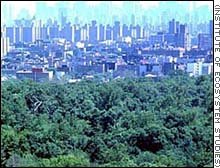
|
|

|
|
|
|
|
|
|
|
|
|
SPECIAL
DEAL: Live plants from only $30 CLICK HERE |
||
|
|
||

| CNN WEB SITES: |

|
| TIME INC. SITES: | |
| MORE SERVICES: |
| video on demand |
| video archive |
| audio on demand |
| news email services |
| free email accounts |
| desktop headlines |
|
pointcast |
|
pagenet |
| DISCUSSION: |
| message boards |
| chat |
|
feedback |
| SITE GUIDES: |
| help |
| contents |
|
search |
| FASTER ACCESS: |
| europe |
|
japan |
| WEB SERVICES: |


|
||||
|
|
Cities studied as ecosystems
July
12, 1999
In the past, ecologists usually favored sites for study that were removed from human influence. When urban educators taught ecology they would often bring their students outside of cities to learn about "nature." But that is changing. "As a concept, pristine ecosystems are no longer free from human impact," said Dr. Allan Berkowitz, head of education at the Institute of Ecosystem Studies. "There has been a larger acceptance for embracing human influences in ecosystems." Today, scientists, educators and city planners are beginning to realize that cities are an integral part of the environment, and that along with rain forests and coral reefs, cities also qualify as ecosystems. Groups are now making a more holistic attempt to examine cities, drawing arrows in two directions: How the environment influences people and how people influence the environment. This concept was the focal point of discussion at the Eighth Carey Conference at the Institute of Ecosystem Studies this past April in Milbrook, New York. Jack Shu, a park superintendent with the Office of Community Involvement for California State Parks, pointed out during the conference that sometime in the next decade the child will be born who will tip the balance of humanity from mostly rural to mostly urban. Berkowitz used this concept in his introduction to the conference. "Urbanization is apparently the 'choice' of humanity," he said, "and, indeed, relatively high density settlements might be the most logical way to house people on the globe." Urban areas, Berkowitz said, capture efficiencies of transportation and other services, foster community and fellowship and minimize impacts on extensive parts of the Earth. "Our challenge, then, is to understand these novel - in evolutionary terms - and increasingly universal systems so that we can make them healthy places for all the living things that dwell there, and so we can integrate them with the fewest possible impacts into other ecosystems, both nearby and distant, that they are linked to." Berkowitz explained in an interview that there are several levels of urban ecology. For example, you can study urban birds alone, you can study them in relation to their environment (buildings), or you can study them more comprehensively, in relation to their environment and the people who have made certain decisions influencing their environment. Studying cities requires new strategies that depend an interdisciplinary approach. "When an ecologists come into a city, they will understand quickly that they can't use the same tools they would use to study an alpine meadow. They need to add tools to help them understand the human part of the urban ecosystem, so they need to rely on urban planners," Berkowitz said. "As a concentrated area of activity, cities pose great challenges for study.We will continue to seek ways to foster and maximize the utility of partnerships among scientists and people who live in cities."
Copyright 1999, Environmental News Network, All Rights
Reserved
RELATED STORIES: Southern air pollution study under way
RELATED ENN STORIES: Cities may be key to saving the environment
RELATED SITES: Institute of Ecosystem Studies
|
||||

